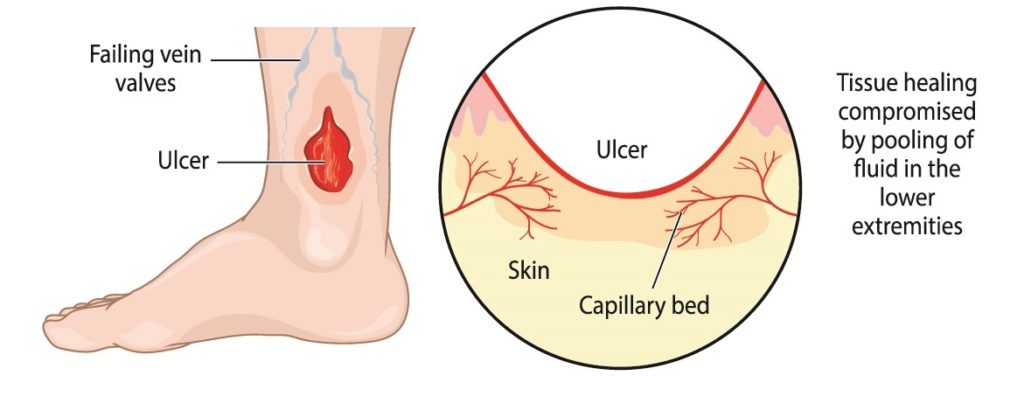It’s not unusual for wounds, blisters, or sores to heal on their own. Most of the time, with some cleansing and care our bodies can do incredible job of healing themselves. But if a wound won’t be healed after a period of 4 to 6 weeks, or if it begins to appear worse, redder, swelling and leaking fluid or emitting a bad smell, then it’s clear there’s something deeper taking place. Small sores can develop into a leg or foot wound that’s not healing. If it’s not treated the wound could cause severe problems and may even lead to an Amputation.

So if you’ve been waiting and watching a sore which will not heal, it might be time to stop waiting and seek help.
What causes some wounds to refuse to heal
Knowing the reasons why a wound won’t heal can help both you and your physician determine the best treatment.
You’re at a higher chance of developing leg and foot wounds that do not heal properly if you suffer from diabetes. Diabetes can cause damage to nerves, so you won’t notice any injury. Additionally, it can hinder blood flow and makes it hard for minor cuts to heal.
Poor circulation is another main factor that can be linked to venous and arterial ulcers. If your veins or arterial arteries aren’t doing their job, you will not get enough oxygen and nutrients to help heal your skin.
Bedores can also form (pressure ulcers) when you suffer from mobility problems. They are a different type of wounds that can be extremely resistant if not treated appropriately.
Healing can be slowed down due to other causes, such as age, certain medications autoimmune diseases, and poor nutrition. Sometimes it’s a combination of these factors that make a wound remain.
How long should healing take? and what happens if it doesn’t?
You might be wondering what the “normal” healing time is. The truth is, the length of time needed to heal is dependent on your health condition and the type wound. A minor blister or cut may heal in two weeks. But if you’re dealing with a deeper foot ulcer or leg wound won’t heal, it might take up to 12 weeks if things are going well.
One thing you must remember is this: if not seeing noticeable improvement after four to six weeks, do not wait. This is the time to consult a professional for wound care because the longer that a wound remains open, the more dangerous it will become.
The Right Help is What You Are Deserving
It’s not “bad luck” that your sore doesn’t heal. The body requires assistance. The good news? There are treatments and specialists that can make a huge difference. Our clinic is specialized in the treatment of foot and leg injuries that don’t heal. We will work with you and your other healthcare providers to develop an action plan that gives your body the highest chance of healing, and also to prevent the possibility of amputations.
There are many solutions, whether it is advanced wound dressings, or restoring blood flow. Also, there are special treatments such as hyperbaric oxygen. We’ll assist you each step of the way, because we are convinced that no person should be forced to treat with a wound that doesn’t heal.
Final Thoughts
Living with a wound that doesn’t heal is more than a physical problem it affects your whole life. There’s some hope. If you’re sick of dealing with a leg injury which won’t heal, or a sore that’s not healing or a painful foot ulcer, don’t be reluctant to ask for help. The faster you seek help, the sooner you can return to the life you desire without the continual anxiety and pain of a painful wound.